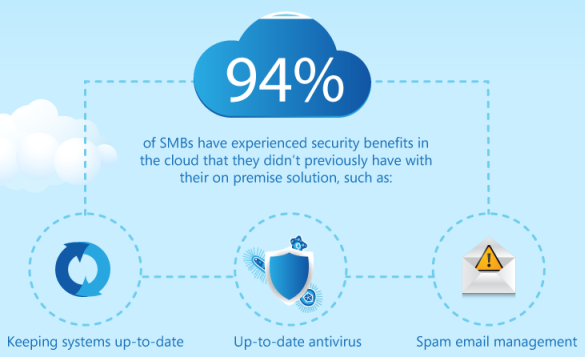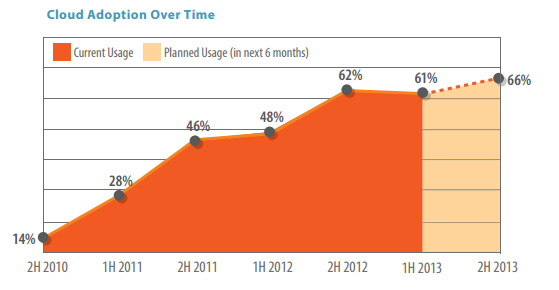Cloud insecurity? It's a perception problem, new study finds
 I've long been a believer that a judgement gap, influenced largely by negative media coverage, is what continues to hold back cloud adoption among small organizations. And judging from the results of a recent study completed by comScore, my intuition has been fairly on track. The biggest issue surrounding cloud uptake, at least for small businesses worldwide, seems to be none other than an issue of perception.
I've long been a believer that a judgement gap, influenced largely by negative media coverage, is what continues to hold back cloud adoption among small organizations. And judging from the results of a recent study completed by comScore, my intuition has been fairly on track. The biggest issue surrounding cloud uptake, at least for small businesses worldwide, seems to be none other than an issue of perception.
How so? The study, which surveyed companies with between 25 to 499 computers in the USA, Germany, France, and the UK, found that 42 percent of small businesses which had yet to adopt cloud technologies were concerned about reliability/uptime. Likewise, a full 60 percent had cited issues with data security as reasoning for staying cloud-free.
In stark contrast, however, the study highlighted numerous beneficial aspects that companies which adopted the cloud were enjoying:
- A full 75 percent noticed better availability of their services after cloud moves.
- 61 percent said that the length of their downtime and the frequency of outages went down across the board.
- Ironically, 62 percent had stated that privacy protection levels actually went up.
- 70 percent of businesses that moved to cloud services were using the time/money saved to re-invest in business expansion and product ideas.
- 50 percent of SMBs surveyed said that they were hunting down new opportunities from the time saved previously managing security.
Adrienne Hall, the general manager of Trustworthy Computing at Microsoft, highlighted the findings of the study. "There’s a big gap between perception and reality when it comes to the cloud. SMBs that have adopted cloud services found security, privacy and reliability advantages to an extent they didn’t expect," she said. "The real silver lining in cloud computing is that it enables companies not only to invest more time and money into growing their business, but to better secure their data and to do so with greater degrees of service reliability as well".

Is the cloud really the black hole the media makes it out to be? If a recent comScore study has any weight behind it, the only thing seemingly holding small business owners back is an incorrect perception about the cloud and its numerous XaaS offerings. (Image Source: Microsoft)
While the study itself didn't delve too far into where this perception gap stems from, it's not hard to connect the dots if you've even had a single eye on the media over the past few years. While uptime, security, and costs have been near universal benefits of cloud adoption, business owners are getting, for lack of a better term, 'spooked' due to the disproportionate coverage garnered by even routine outages.
InfoWorld even dedicated an entire slide series to "The Worst Cloud Outages of 2013" and noted examples like Amazon's AWS outage from January which lasted a mere 49 minutes, and Microsoft's two hour outage of services like Office 365 in early February. In all fairness, some outages do last longer, but these are few and far in between.
To put things in perspective, the few customers my IT consulting company has left running on-premise servers like Exchange experience on average about 4-8 hours of downtime from first report to final resolution. I'm not referencing little issues; I'm talking items which you would classify as 'outage' worthy. These problems are exacerbated the older these systems get, especially when clients prefer to run their IT operations on a shoestring budget. While they think that they are saving money on recurring cloud costs, they forget about the emergency labor fees, time spent on the phone by both ends troubleshooting outages, among other negatives.
Some of these over-emotionalized reports of cloud outages are clearly out of touch, and their effect on perception is still pretty strong. I'm in discussions every month with customers who are sifting through information that is disproportionately bogged down with negative news reports about small outages of services they may be researching.
When I ask them how many hours their own internal systems spent out of commission the last year, the focal point of the discussion immediately changes as reality sets in. Just because there is a lot of heat on cloud providers in the media for downtime, it doesn't mean their systems are faring any worse than on-premise installations. In fact, I'm finding the exact opposite to be the case more than 9 times out of 10.
SpiceWorks Study: SMB Cloud Adoption Up, and Still Rising
In a completely unrelated set of findings by enterprise helpdesk giant SpiceWorks, SMB adoption of cloud services has been surging upward since 2010. In it's annual "State of SMB IT" report released a few months back, the organization found that current cloud adoption by small businesses stands at about 61 percent but is expected to jump up to 66 percent by year's end 2013. While the growth figures have slowed considerably compared to 2010 and 2011, the fact that over three-fifths of small businesses are in the cloud by now is a wonderful benchmark for the industry.

SpiceWorks reported in its latest "State of SMB IT" report that cloud adoption among small businesses is currently at about 61 percent, and is projected to hit 66 percent by year's end. This growth is very likely being spurred by rock-solid solutions like Office 365, Google Apps, and Windows Azure -- all platforms my own customers are adopting at unbelievable rates. (Image Source: Spiceworks)
That's not the only bright spot in the SpiceWorks findings. Virtualization of servers, which was only under consideration by most small businesses just 3-4 years ago, has taken the industry by storm as heavily as cloud services. 72 percent of small business IT pros claim that they are leveraging virtualization technologies right now, and an even higher amount -- 80 percent -- plan on adopting tools like Hyper-V or VMWare by the end of the year.
I've been getting into the virtualization arena myself, but have been steadily recommending Windows Azure for clients needing to take down physical boxes. The service has been exceeding customer expectations in reliability and cost, as I mentioned in my recent review.
Other Factors Likely to Notch Adoption Upwards Soon
I personally think the wholesale move to the cloud by small businesses can be seen as being carved out by two camps: those which adopted early, and those which are going to make the move when the lifecycles of their on-premise systems are up for consideration again. I'm personally seeing this in my own customer base quite a lot.
Some clients that were on near-dead Exchange 2003 systems made the moves to Google Apps and Office 365 when their time was up, and the remaining suspects running newer platforms like Exchange 2007 and 2010 are merely biding their time -- or sucking out every last dime of ROI on their physical servers, more appropriately.
Either way, the overall movement and adoption of cloud services is gradually becoming an easier sell. Firstly, with so many others already having acted as the 'guinea pigs' for the rest of us, there are a lot of success stories being shared which is helping overcome the media's nasty propensity to jump on cloud outages with disproportionate vigor.
And second, as the economies of scale behind these large platforms evolve, such as is the case for Windows Azure, prices continue to drop. If the cloud is to live up to its cost-saving reputation, prices on these SaaS and PaaS offerings need to continue creeping downward.
Are pure cloud solutions always the right choice for everyone? Of course not. Hybrid clouds and even fully private clouds are acceptable alternatives to the big boys on the market like Office 365, Google Apps, and Windows Azure. Some industries have data privacy concerns that are very finite which cannot be properly accounted for in a public cloud ecosystem. But as the industry continues its path of maturity, these issues will continue to shrink.
If there's any sector out there that's leading the cloud adoption bandwagon race, it's quite clearly small business. And who can blame them? With budgets that rarely can support dedicated IT staff, and a need to spend money on profitable functions, keeping dinosaur technology systems up and running is becoming less and less appealing. Let's see if this trend will trickle upward into the midsize and enterprise as well. Only time will tell.
Photo Credit: jörg röse-oberreich/Shutterstock
 Derrick Wlodarz is an IT Specialist that owns Park Ridge, IL (USA) based technology consulting & service company FireLogic, with over 8+ years of IT experience in the private and public sectors. He holds numerous technical credentials from Microsoft, Google, and CompTIA and specializes in consulting customers on growing hot technologies such as Office 365, Google Apps, cloud hosted VoIP, among others. Derrick is an active member of CompTIA's Subject Matter Expert Technical Advisory Council that shapes the future of CompTIA exams across the world. You can reach him at derrick at wlodarz dot net.
Derrick Wlodarz is an IT Specialist that owns Park Ridge, IL (USA) based technology consulting & service company FireLogic, with over 8+ years of IT experience in the private and public sectors. He holds numerous technical credentials from Microsoft, Google, and CompTIA and specializes in consulting customers on growing hot technologies such as Office 365, Google Apps, cloud hosted VoIP, among others. Derrick is an active member of CompTIA's Subject Matter Expert Technical Advisory Council that shapes the future of CompTIA exams across the world. You can reach him at derrick at wlodarz dot net.